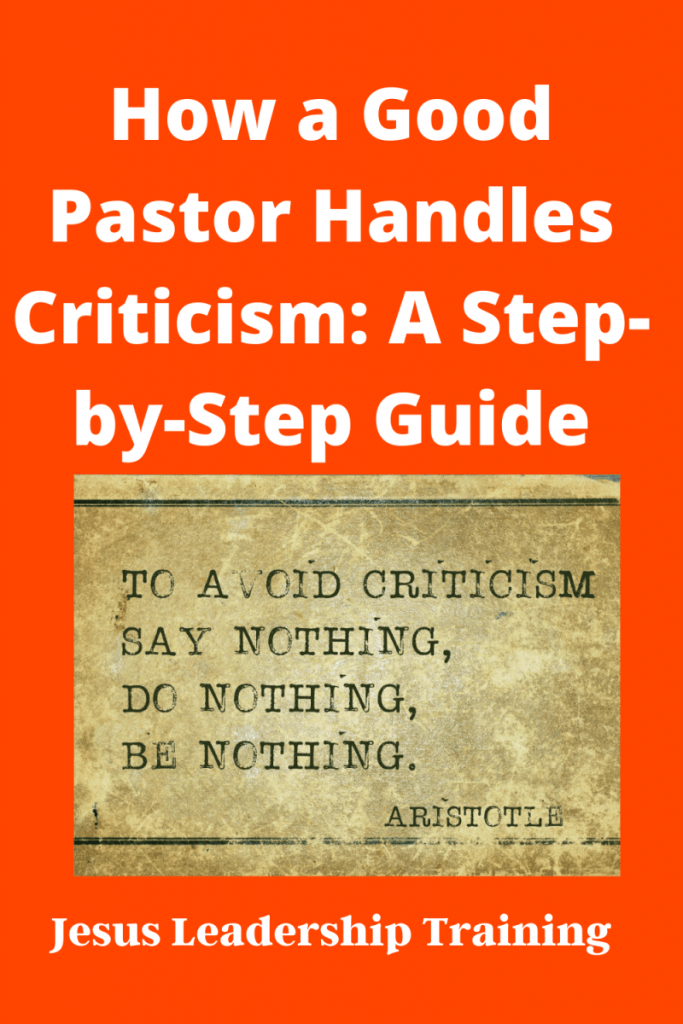Table of Contents
How a Good Pastor Handles Criticism: A Step-by-Step Guide
How a Good Pastor handles Criticism? Pastors will always face criticism, whether they know it or not. Someone will have something to say about what a pastor says, does, or how he or she lives their life. The criticism may be positive or negative but at the end of the day, it affects the pastor in a negative way. There are ways that a pastor can handle criticism positively and learn from it. This article will give you a step-by-step guide on how to handle criticism, taking what is true, and letting go of the lies.
A Step-by-Step Guide for a Pastor to Handle Criticism
1. Listen Carefully
A good pastor will listen carefully to the criticism leveled against him or her without making judgments. The goal is to establish whether the criticism is genuine or a fabrication. It is not easy listening to what other people have to say about your ministry when their report is negative. The good thing is that you get to know what others think and how they perceive what you are doing. Criticism can relate to any area of a pastor’s life, for example, preaching, leading, family life, or regular behavior.
Proverbs 1:5 says, “Let the wise listen and add to their learning, and let the discerning get guidance.” It is wise to listen to what others have to say knowing that God will help you deal with everything that is said about you.
2. Pray
After listening to the criticism, pray and ask God for the wisdom to know what to do about what you hear. According to James 5:13, we should pray when we encounter anything unpleasant. “Is anyone among you in trouble? Let them pray. Is anyone happy? Let them sing songs of praise.” Prayer will give the pastor an opportunity to take the matter to God, who knows the truth and will give him or her divine counsel.
When you pray, God gives you peace, and you can respond to criticism objectively and not in an emotional manner. Prayer invites divine intervention into the situation and the wisdom to know what to do. God has the answers you seek and will reveal them to you.
3. Sift the Truth from the Lies
The wisdom to sift the truth from the lies comes from reading and meditating on God’s Word. When you pray, you invite God to help you discern the truth from the lies, and as you read the Bible, you will see if there are areas where you are in error. The Bible is a book that God gave us to lead us into the truth regarding any matter and to shed light on it.
The Word of God is a lamp for your feet and a light on your path. It will guide your steps as you deal with the criticism that has come against you. The Word of God will help you sift what you need to keep and learn from, and what to let go of and move on. John 8:32 says that you will know the truth, and it will set you free.

4. Repent if on the Wrong
None of us is perfect, and where we are on the wrong, we are to repent and ask for God’s forgiveness. Repentance is not a sign of weakness but strength because you recognize that God has the power to help you change where you need to do so. 2 Corinthians 7:10 says, “Godly sorrow brings repentance that leads to salvation and leaves no regret, but worldly sorrow brings death.” For the negative criticism that happens to be true, bring it before God and let Him cleanse you from your sin. You will move on without regret and you will give God the chance to teach you from the experience.
By repenting, you are acknowledging that you have not always been right when shepherding God’s people. Once you know your mistake, you will know how to deal with it, and become a pastor who leads others to Christ.
5. Receive God’s Healing and Deliverance
Allow God to heal you and deliver you from any habitual sin that may have led to the criticism.
Hearing negative things from others and especially in the church can hurt your feelings and leave you angry and bitter. God’s desire is to restore your heart to wholeness so that nothing will hinder the work that God has given you as a pastor of His people.

You can stand on Psalm 30:2 and trust that God will heal you. “Lord my God, I called to you for help, and you healed me.” Being a pastor does not mean that you will never need God’s healing, you will. You may be in charge of your church or ministry but as a human being, you will make mistakes and you definitely want to learn from them.
6. Grow from the criticism
You can grow from criticism if you handle it the right way. Your wisdom will soar and so will your ability to lead your church with excellence.
Criticism can help you grow strong in your faith and become a better leader. According to Psalm 92:12, the righteous will flourish like a palm tree and will grow like the cedar of Lebanon.
Positive criticism will reveal your areas of weakness and you can work on them. This is not something you do on your own but with God’s help. Negative criticism will show you the things you don’t need to pay attention to because they are destructive. God’s will is that we will grow and become mature Christians who can steward well the gifts He has given us.
Conclusion
As a pastor, you can deal with the criticism that comes you way because God has equipped you to know what to do with it. Never try to deal with the comments or opinions of others on your own. If there is a trusted friend or mentor who can walk with you, let them know the situation, and listen to their wise counsel. Pastor with boldness knowing that God is with you along your journey of leading others to Him.
Always be patient, there are many faithful Christians that would correct me after sermons I gave. You Smile and say thank you. If it is wisdom Learn from it. God Bless Greg




